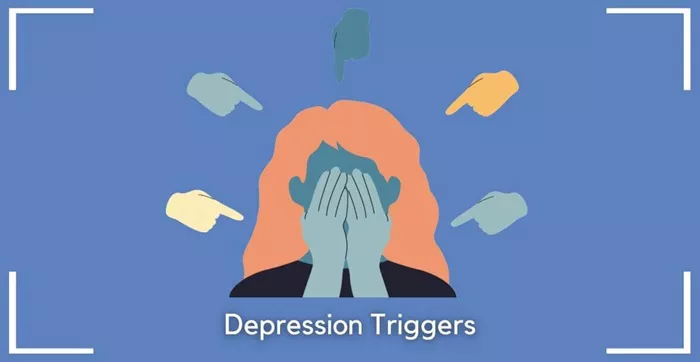Manic depression is a mental illness that affects a large number of people worldwide, and the incidence and mortality of the disease are increasing year by year. Manic depression is a complex disease caused by many factors, including biological factors, psychological factors, social factors and so on. This article will introduce and analyze these factors, and explore how to prevent and treat manic depression.
Biological factors cause manic depression
1. Genetic factor
The study found that manic depression may be linked to genetic factors. Many studies have shown that manic depression is a genetic disorder, with people who have it running in the family at higher risk. The same study also found that the transporter of serotonin and dopamine, the serotonin receptor, BDNF and GRK3 genes may be involved in the onset of manic depression.
2. Neurobiochemical changes
The onset of manic depression is closely related to neurobiochemical changes, especially changes in the level of neurotransmitters in the brain. For example, changes in dopamine and norepinephrine in the brain can lead to mood, motivation, and cognitive impairment. Serum free triiodothyronine (FTI) concentration may also be associated with the onset of manic depression.
3. Abnormal brain function
MRI and functional MRI can observe functional or organic changes in brain areas that have a fundamental impact on the onset of manic depression. For example, the structure and volume of a patient’s amygdala, prefrontal lobe, hypothalamus, dorsolateral striatum, hippocampus and other regions are associated with the onset of manic depression.
Psychological factors cause manic depression
1. Psychological trauma
Psychological trauma is another important factor that leads to manic depression in individuals. Patients who have experienced trauma are more likely to have normal emotions. Individuals who have experienced sexual abuse, domestic violence, relationship disruption, etc., are more likely to develop manic depression.
2. Way of thinking
Thinking patterns and behavior patterns are also linked to the development of the disease. Patients sometimes use inappropriate methods of emotion regulation that lead to the development of manic depression, such as watching TV, eating snacks, drinking alcohol, smoking, shopping, etc., which can cause important events to be delayed.
3. Mental health and interpersonal communication
Mental health and interpersonal interactions are also crucial to the progression of manic depression. Ignoring health and personal needs can lead to a kind of “anxious loneliness” that can eventually lead to the onset of manic depression.
Social factors cause manic depression
1. Targeted social pressure
Social pressures such as occupational and financial pressures, marital relationships, and a sense of responsibility can all contribute to mental health problems. The intensification of these pressures can lead to inappropriate behavior, emotional instability, suicide and other problems.
2. Category discrimination and bias
Just as individuals viewing themselves as a group can damage their mental health, so too can confronting demeaning, discrimination, and prejudice in the right environment lead to physical and psychological damage. Such conditions eventually lead to physical and mental exhaustion, vulnerability and susceptibility to mental illness.
3. Social isolation and lack of support
Living in a poor social environment, being single or divorced, and having a difficult job can especially lead to social isolation and lack of support. Such conditions tend to lead to the loss of interpersonal relationships and social support networks in depressed patients because of isolation, which is clearly linked to the worsening of manic depression.
Prevention and treatment of manic depression
1. Know the patient
Understanding the patient is important for assessing and treating manic depression. Understanding the patient’s physical and psychological history, as well as the family situation, is the most basic consideration. Because many of the symptoms of manic depression are similar to the side effects of certain diseases or medications, the treatment is not the same. With a detailed understanding of the patient, false diagnosis and misdiagnosis can be prevented.
See Also: Can someone with bipolar know when they are manic?
2. psychotherapy
Psychotherapy can effectively relieve manic-depressive symptoms. Compared with drug therapy, psychotherapy can better help patients face and deal with some non-biological problems and factors, such as experienced psychological trauma. If needed, a combination of medication and psychotherapy may be chosen.
3. Drug therapy
Medication is one of the main ways to treat manic depression. Some antidepressants, antipsychotics, and anticonvulsants can be used to treat manic depression. However, care should be taken to avoid the side effects of improper use of drugs and psychiatric treatment, especially the need to gradually adjust the order of drug treatment and minimize the use of stimulant drugs and drugs.
4. Lifestyle change
Changing those harmful lifestyle and illegal behaviors, improving quality of life, learning to seek support, and proper exercise can also improve symptoms of manic depression.
5. Relaxation technique
Cognitive behavioral therapy, which alleviates patients’ anxiety, discloses mental distribution, finds confusion, relaxation techniques, and progressive muscle relaxation, can improve self-control and relieve symptoms in manic-depressive patients.
6. Social support network
Building a support network and social network is also an important way to treat manic depression. Finding the right support and safe people in the social environment such as family, friends, colleagues, and building enough trust can reduce the incidence of social isolation and depression.
Conclusion
The cause of manic depression cannot simply be blamed on one specific factor. In order to introduce the clinical situation of manic depression in detail, this paper analyzes the causes of this disease from three aspects: biological, psychological and social. Treatment and prevention of manic depression requires meeting individual needs and behavior patterns, establishing secure social relationships, and providing psychological and pharmacological treatment and appropriate lifestyle norms. To reduce the incidence of manic depression and improve the physical and mental health of patients.
Related Topics:



























